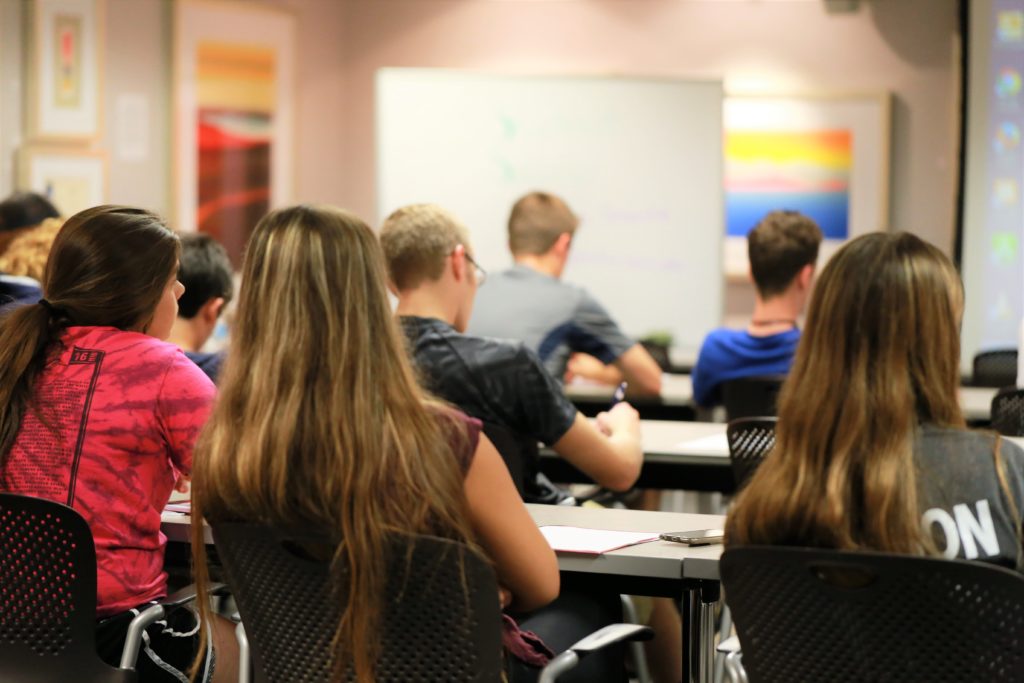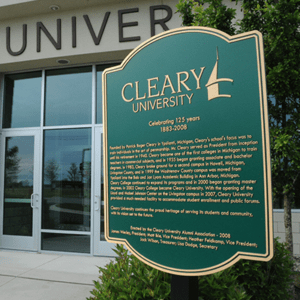The average person spends 90,000 hours over the course of their life at work. That’s a lot of time devoted to an endeavor which, if you don’t love what you’re doing, can feel like drudgery.
In honor of Valentine’s Day, we want to share how Cleary University helps students, graduates, and alumni find work they love.

Detroit Lions executive and student networking event 
Recruitment event: Nike corporate on Campus
We help our students find positions, internships, and opportunities. We help students and alumni with resumes and resume revisions. Anything that supports career development, we are here to help, says Amy Denton, Director of Career Development at Cleary University.
We try to encourage students to tie their passion into a profession. Admittedly, that’s easy for some people and harder for others.
You don’t necessarily have to love love love your job, but you sure as heck should like it an awful lot, Denton says. We try to tell students to avoid choosing a profession just because it sounds glamorous or they think they’ll get rich. It’s so important to have drive and motivation to wake up every morning and eagerly go to work. It has to speak to your soul.
This process of career development begins freshman year at Cleary, with a mandatory three-semester course, CAR 1000, or Career Development, which is taught online. In this course, students explore and discover their strengths, do personality assessments, and try to identify what they are suited for early on, Denton explains.

Detroit Pistons executive networking event 
Dominos Corporate Headquarters internship recruitment fair
Many Cleary students come in with majors already declared, but even if they don’t, we try to foster those fundamentals with all students as early as possible.
One assignment helps students look at their leadership strengths. Do they build influence? Think strategically? Excel at building relationships? Once they know these specific traits, they can parlay them into career options.
For example, a person who excels at relationships, builds harmony and makes connections might be ideally suited for sales, marketing or consulting professions.
Even when a student thinks they know their future career path, that may change as they immerse in classes and self-study. So much of the college experience involves trying things on and seeing what fits. A great internship can help mold a career decision – in either direction! It can be a win, where the student feels like he’s in his sweet spot and that internship leads to a career. Or it can be a learning experience where the student identifies that this is definitely not the career path she wants.

Detroit campus Hospitality career fair 
Detroit Pistons executive networking event
When thinking about your future career path, consider these defining tips:
- Always investigate the company’s culture. If you’re considering an internship or job, do your research, Denton says. Ask people you know who already work there for some feedback. If you don’t know anyone, investigate online at Glass Door or by simply searching for the company. Do your homework. Don’t settle for the first thing that comes your way. Make sure the company culture where you’re going to be working 40 hours a week aligns with what you’re looking for.
- Don’t choose a profession because it sounds good. Being a neurosurgeon might be fascinating work and very lucrative, but it’s not a successful path for everyone. Do something that makes sense for you and your skills. Parlay passion and professional attributes into a career path.
- Be realistic. Especially when it comes to internships, know that you’re starting out at the bottom of the ladder, and that’s ok. You may not be fetching coffee (or you might!), but often you’re also not going to get the most important tasks, Denton cautions. In an internship, especially, it should be a mutual learning experience. The employer should be fostering the growth of the student, and the student should soak up every last tidbit of information. There are going to be speed bumps here and there; and there should be. Not every day is butterflies and unicorns. But that’s ok. That is absolutely realistic and healthy.
- It’s never too late. While some students know from a young age what career path they want to pursue, many do not. Investigate, do assessments, learn as much as you can about career exploration and what particular professions entail. A job as a private investigator would not be a good choice if you don’t want to sit in a car all day.
- Network. Every relationship is useful and helpful! You never know where a relationship can take you – or where you can help someone else. Use your resources. Denton often hears students say, “I don’t really know anybody.” That’s not true! Tap into friends’ parents, your parents, your parents’ friends, your dentist, anybody. Ask questions, ask for introductions, and be open to listening and learning. We need to always be networking, even starting in high school! Cleary has professional organizations on campus – make use of them once you enroll! Denton says, there is truth to the adage it’s not what you know; it’s who you know. There needs to be a nice balance between the two.









